Mark Zuckerberg's Leadership and Stakeholder Management
VerifiedAdded on 2023/06/07
|11
|2801
|318
AI Summary
This report analyses the development, capability, and achievement of Mark Zuckerberg, the creator of Facebook, who is also one of the youngest billionaires in the world. It evaluates his leadership style and practice, along with the struggles and criticisms faced by stakeholders. The report also provides actionable recommendations for Zuckerberg to remain successful in the future.
Contribute Materials
Your contribution can guide someone’s learning journey. Share your
documents today.
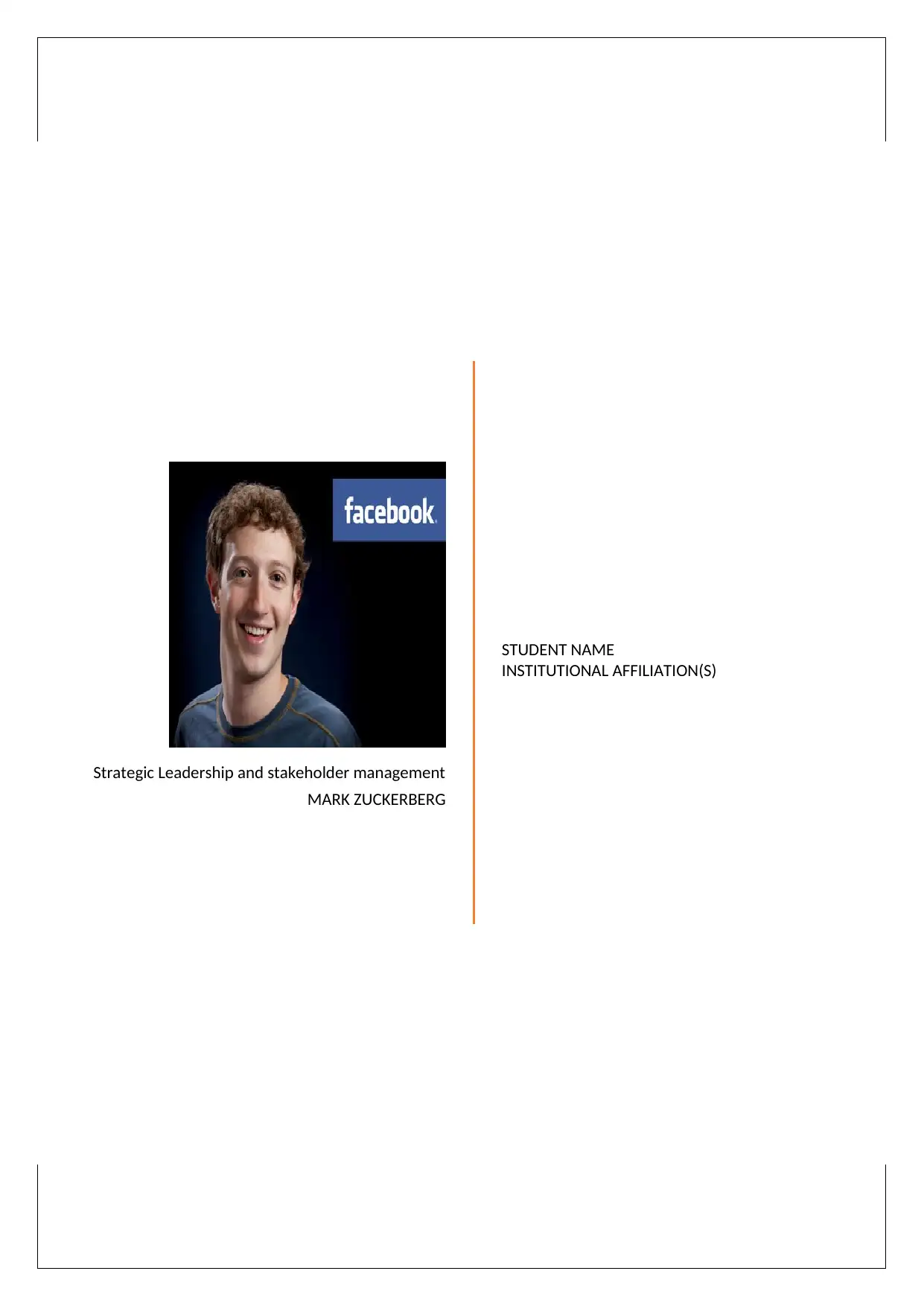
Strategic Leadership and stakeholder management
MARK ZUCKERBERG
STUDENT NAME
INSTITUTIONAL AFFILIATION(S)
MARK ZUCKERBERG
STUDENT NAME
INSTITUTIONAL AFFILIATION(S)
Secure Best Marks with AI Grader
Need help grading? Try our AI Grader for instant feedback on your assignments.
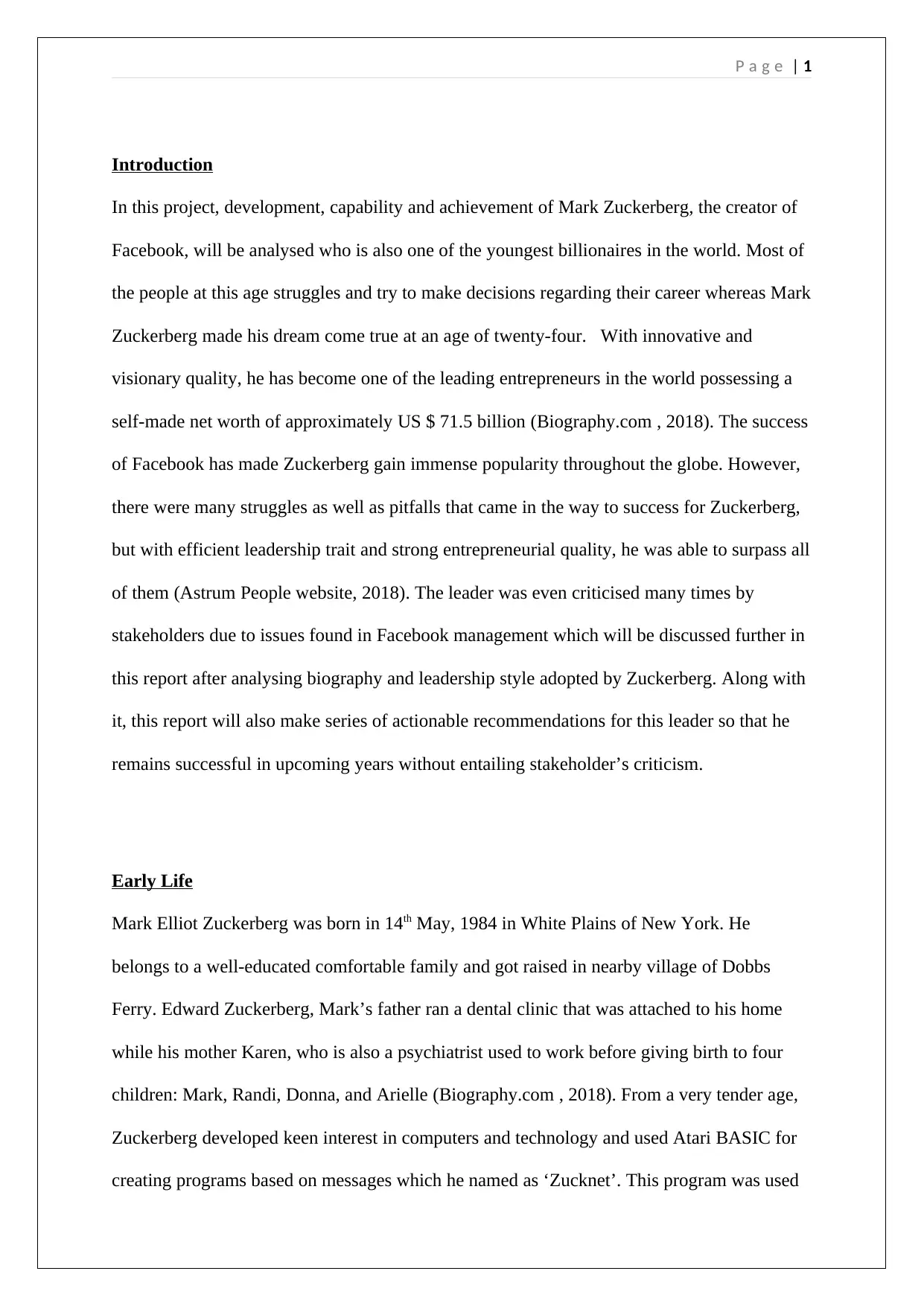
P a g e | 1
Introduction
In this project, development, capability and achievement of Mark Zuckerberg, the creator of
Facebook, will be analysed who is also one of the youngest billionaires in the world. Most of
the people at this age struggles and try to make decisions regarding their career whereas Mark
Zuckerberg made his dream come true at an age of twenty-four. With innovative and
visionary quality, he has become one of the leading entrepreneurs in the world possessing a
self-made net worth of approximately US $ 71.5 billion (Biography.com , 2018). The success
of Facebook has made Zuckerberg gain immense popularity throughout the globe. However,
there were many struggles as well as pitfalls that came in the way to success for Zuckerberg,
but with efficient leadership trait and strong entrepreneurial quality, he was able to surpass all
of them (Astrum People website, 2018). The leader was even criticised many times by
stakeholders due to issues found in Facebook management which will be discussed further in
this report after analysing biography and leadership style adopted by Zuckerberg. Along with
it, this report will also make series of actionable recommendations for this leader so that he
remains successful in upcoming years without entailing stakeholder’s criticism.
Early Life
Mark Elliot Zuckerberg was born in 14th May, 1984 in White Plains of New York. He
belongs to a well-educated comfortable family and got raised in nearby village of Dobbs
Ferry. Edward Zuckerberg, Mark’s father ran a dental clinic that was attached to his home
while his mother Karen, who is also a psychiatrist used to work before giving birth to four
children: Mark, Randi, Donna, and Arielle (Biography.com , 2018). From a very tender age,
Zuckerberg developed keen interest in computers and technology and used Atari BASIC for
creating programs based on messages which he named as ‘Zucknet’. This program was used
Introduction
In this project, development, capability and achievement of Mark Zuckerberg, the creator of
Facebook, will be analysed who is also one of the youngest billionaires in the world. Most of
the people at this age struggles and try to make decisions regarding their career whereas Mark
Zuckerberg made his dream come true at an age of twenty-four. With innovative and
visionary quality, he has become one of the leading entrepreneurs in the world possessing a
self-made net worth of approximately US $ 71.5 billion (Biography.com , 2018). The success
of Facebook has made Zuckerberg gain immense popularity throughout the globe. However,
there were many struggles as well as pitfalls that came in the way to success for Zuckerberg,
but with efficient leadership trait and strong entrepreneurial quality, he was able to surpass all
of them (Astrum People website, 2018). The leader was even criticised many times by
stakeholders due to issues found in Facebook management which will be discussed further in
this report after analysing biography and leadership style adopted by Zuckerberg. Along with
it, this report will also make series of actionable recommendations for this leader so that he
remains successful in upcoming years without entailing stakeholder’s criticism.
Early Life
Mark Elliot Zuckerberg was born in 14th May, 1984 in White Plains of New York. He
belongs to a well-educated comfortable family and got raised in nearby village of Dobbs
Ferry. Edward Zuckerberg, Mark’s father ran a dental clinic that was attached to his home
while his mother Karen, who is also a psychiatrist used to work before giving birth to four
children: Mark, Randi, Donna, and Arielle (Biography.com , 2018). From a very tender age,
Zuckerberg developed keen interest in computers and technology and used Atari BASIC for
creating programs based on messages which he named as ‘Zucknet’. This program was used
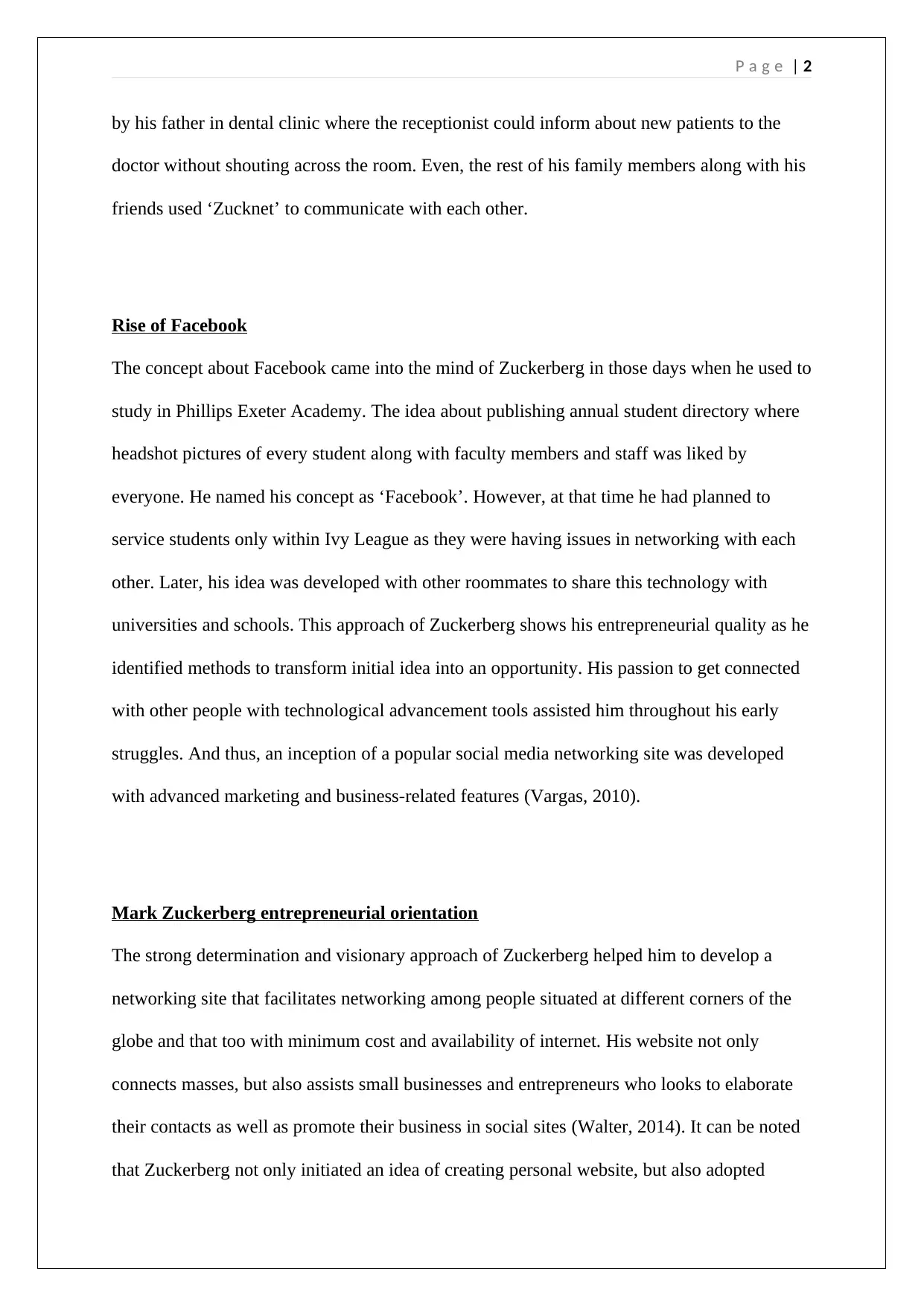
P a g e | 2
by his father in dental clinic where the receptionist could inform about new patients to the
doctor without shouting across the room. Even, the rest of his family members along with his
friends used ‘Zucknet’ to communicate with each other.
Rise of Facebook
The concept about Facebook came into the mind of Zuckerberg in those days when he used to
study in Phillips Exeter Academy. The idea about publishing annual student directory where
headshot pictures of every student along with faculty members and staff was liked by
everyone. He named his concept as ‘Facebook’. However, at that time he had planned to
service students only within Ivy League as they were having issues in networking with each
other. Later, his idea was developed with other roommates to share this technology with
universities and schools. This approach of Zuckerberg shows his entrepreneurial quality as he
identified methods to transform initial idea into an opportunity. His passion to get connected
with other people with technological advancement tools assisted him throughout his early
struggles. And thus, an inception of a popular social media networking site was developed
with advanced marketing and business-related features (Vargas, 2010).
Mark Zuckerberg entrepreneurial orientation
The strong determination and visionary approach of Zuckerberg helped him to develop a
networking site that facilitates networking among people situated at different corners of the
globe and that too with minimum cost and availability of internet. His website not only
connects masses, but also assists small businesses and entrepreneurs who looks to elaborate
their contacts as well as promote their business in social sites (Walter, 2014). It can be noted
that Zuckerberg not only initiated an idea of creating personal website, but also adopted
by his father in dental clinic where the receptionist could inform about new patients to the
doctor without shouting across the room. Even, the rest of his family members along with his
friends used ‘Zucknet’ to communicate with each other.
Rise of Facebook
The concept about Facebook came into the mind of Zuckerberg in those days when he used to
study in Phillips Exeter Academy. The idea about publishing annual student directory where
headshot pictures of every student along with faculty members and staff was liked by
everyone. He named his concept as ‘Facebook’. However, at that time he had planned to
service students only within Ivy League as they were having issues in networking with each
other. Later, his idea was developed with other roommates to share this technology with
universities and schools. This approach of Zuckerberg shows his entrepreneurial quality as he
identified methods to transform initial idea into an opportunity. His passion to get connected
with other people with technological advancement tools assisted him throughout his early
struggles. And thus, an inception of a popular social media networking site was developed
with advanced marketing and business-related features (Vargas, 2010).
Mark Zuckerberg entrepreneurial orientation
The strong determination and visionary approach of Zuckerberg helped him to develop a
networking site that facilitates networking among people situated at different corners of the
globe and that too with minimum cost and availability of internet. His website not only
connects masses, but also assists small businesses and entrepreneurs who looks to elaborate
their contacts as well as promote their business in social sites (Walter, 2014). It can be noted
that Zuckerberg not only initiated an idea of creating personal website, but also adopted
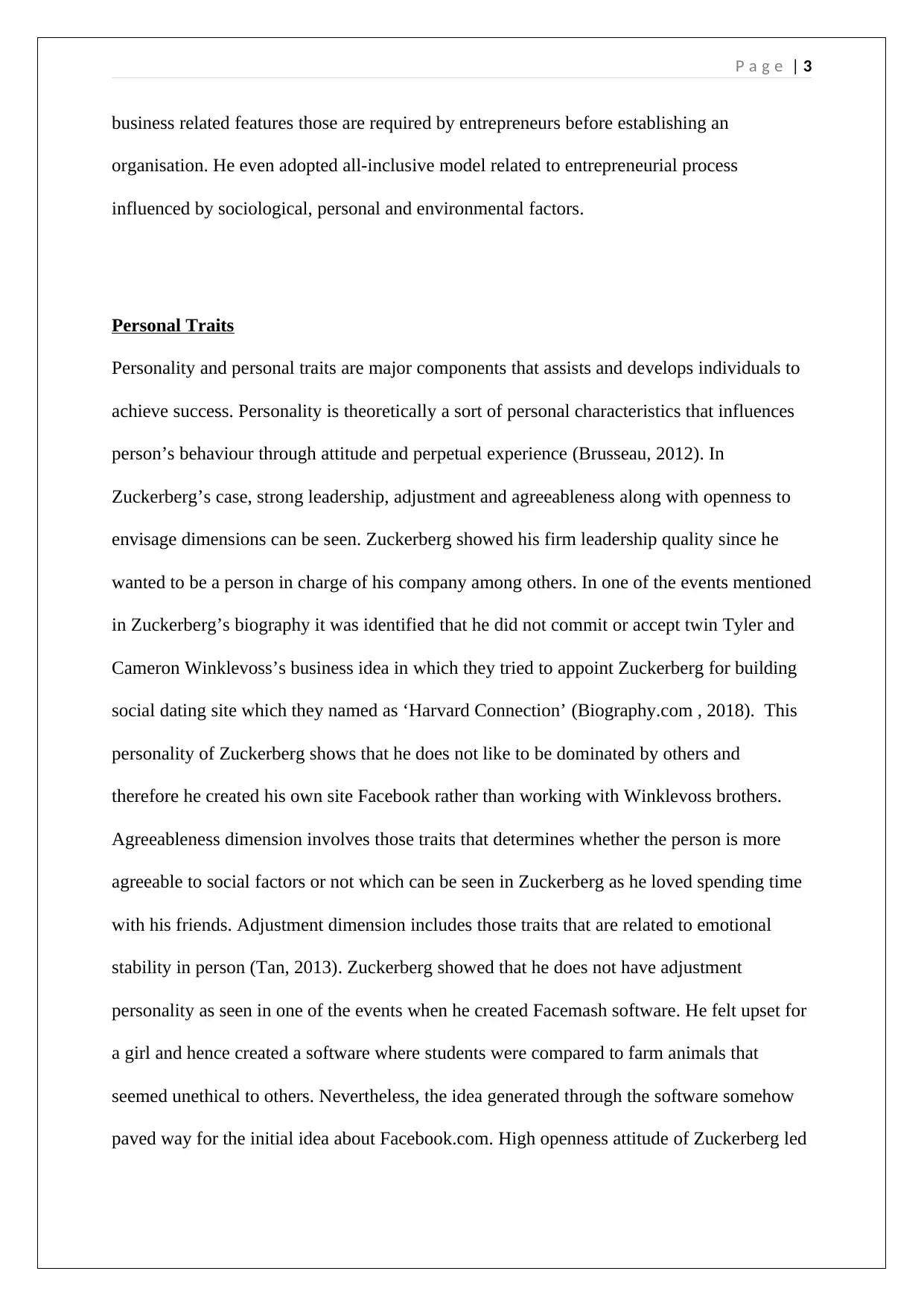
P a g e | 3
business related features those are required by entrepreneurs before establishing an
organisation. He even adopted all-inclusive model related to entrepreneurial process
influenced by sociological, personal and environmental factors.
Personal Traits
Personality and personal traits are major components that assists and develops individuals to
achieve success. Personality is theoretically a sort of personal characteristics that influences
person’s behaviour through attitude and perpetual experience (Brusseau, 2012). In
Zuckerberg’s case, strong leadership, adjustment and agreeableness along with openness to
envisage dimensions can be seen. Zuckerberg showed his firm leadership quality since he
wanted to be a person in charge of his company among others. In one of the events mentioned
in Zuckerberg’s biography it was identified that he did not commit or accept twin Tyler and
Cameron Winklevoss’s business idea in which they tried to appoint Zuckerberg for building
social dating site which they named as ‘Harvard Connection’ (Biography.com , 2018). This
personality of Zuckerberg shows that he does not like to be dominated by others and
therefore he created his own site Facebook rather than working with Winklevoss brothers.
Agreeableness dimension involves those traits that determines whether the person is more
agreeable to social factors or not which can be seen in Zuckerberg as he loved spending time
with his friends. Adjustment dimension includes those traits that are related to emotional
stability in person (Tan, 2013). Zuckerberg showed that he does not have adjustment
personality as seen in one of the events when he created Facemash software. He felt upset for
a girl and hence created a software where students were compared to farm animals that
seemed unethical to others. Nevertheless, the idea generated through the software somehow
paved way for the initial idea about Facebook.com. High openness attitude of Zuckerberg led
business related features those are required by entrepreneurs before establishing an
organisation. He even adopted all-inclusive model related to entrepreneurial process
influenced by sociological, personal and environmental factors.
Personal Traits
Personality and personal traits are major components that assists and develops individuals to
achieve success. Personality is theoretically a sort of personal characteristics that influences
person’s behaviour through attitude and perpetual experience (Brusseau, 2012). In
Zuckerberg’s case, strong leadership, adjustment and agreeableness along with openness to
envisage dimensions can be seen. Zuckerberg showed his firm leadership quality since he
wanted to be a person in charge of his company among others. In one of the events mentioned
in Zuckerberg’s biography it was identified that he did not commit or accept twin Tyler and
Cameron Winklevoss’s business idea in which they tried to appoint Zuckerberg for building
social dating site which they named as ‘Harvard Connection’ (Biography.com , 2018). This
personality of Zuckerberg shows that he does not like to be dominated by others and
therefore he created his own site Facebook rather than working with Winklevoss brothers.
Agreeableness dimension involves those traits that determines whether the person is more
agreeable to social factors or not which can be seen in Zuckerberg as he loved spending time
with his friends. Adjustment dimension includes those traits that are related to emotional
stability in person (Tan, 2013). Zuckerberg showed that he does not have adjustment
personality as seen in one of the events when he created Facemash software. He felt upset for
a girl and hence created a software where students were compared to farm animals that
seemed unethical to others. Nevertheless, the idea generated through the software somehow
paved way for the initial idea about Facebook.com. High openness attitude of Zuckerberg led
Secure Best Marks with AI Grader
Need help grading? Try our AI Grader for instant feedback on your assignments.
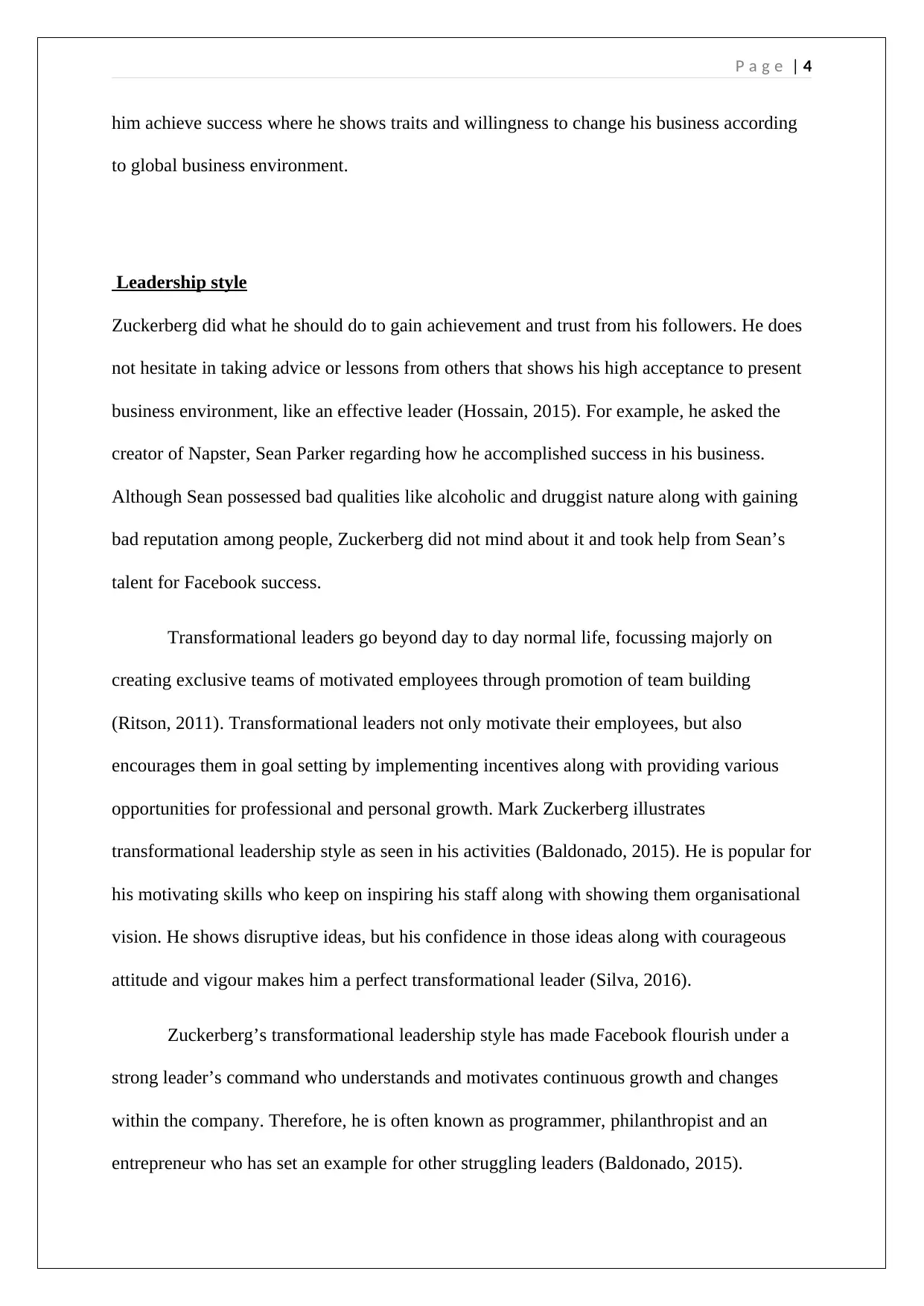
P a g e | 4
him achieve success where he shows traits and willingness to change his business according
to global business environment.
Leadership style
Zuckerberg did what he should do to gain achievement and trust from his followers. He does
not hesitate in taking advice or lessons from others that shows his high acceptance to present
business environment, like an effective leader (Hossain, 2015). For example, he asked the
creator of Napster, Sean Parker regarding how he accomplished success in his business.
Although Sean possessed bad qualities like alcoholic and druggist nature along with gaining
bad reputation among people, Zuckerberg did not mind about it and took help from Sean’s
talent for Facebook success.
Transformational leaders go beyond day to day normal life, focussing majorly on
creating exclusive teams of motivated employees through promotion of team building
(Ritson, 2011). Transformational leaders not only motivate their employees, but also
encourages them in goal setting by implementing incentives along with providing various
opportunities for professional and personal growth. Mark Zuckerberg illustrates
transformational leadership style as seen in his activities (Baldonado, 2015). He is popular for
his motivating skills who keep on inspiring his staff along with showing them organisational
vision. He shows disruptive ideas, but his confidence in those ideas along with courageous
attitude and vigour makes him a perfect transformational leader (Silva, 2016).
Zuckerberg’s transformational leadership style has made Facebook flourish under a
strong leader’s command who understands and motivates continuous growth and changes
within the company. Therefore, he is often known as programmer, philanthropist and an
entrepreneur who has set an example for other struggling leaders (Baldonado, 2015).
him achieve success where he shows traits and willingness to change his business according
to global business environment.
Leadership style
Zuckerberg did what he should do to gain achievement and trust from his followers. He does
not hesitate in taking advice or lessons from others that shows his high acceptance to present
business environment, like an effective leader (Hossain, 2015). For example, he asked the
creator of Napster, Sean Parker regarding how he accomplished success in his business.
Although Sean possessed bad qualities like alcoholic and druggist nature along with gaining
bad reputation among people, Zuckerberg did not mind about it and took help from Sean’s
talent for Facebook success.
Transformational leaders go beyond day to day normal life, focussing majorly on
creating exclusive teams of motivated employees through promotion of team building
(Ritson, 2011). Transformational leaders not only motivate their employees, but also
encourages them in goal setting by implementing incentives along with providing various
opportunities for professional and personal growth. Mark Zuckerberg illustrates
transformational leadership style as seen in his activities (Baldonado, 2015). He is popular for
his motivating skills who keep on inspiring his staff along with showing them organisational
vision. He shows disruptive ideas, but his confidence in those ideas along with courageous
attitude and vigour makes him a perfect transformational leader (Silva, 2016).
Zuckerberg’s transformational leadership style has made Facebook flourish under a
strong leader’s command who understands and motivates continuous growth and changes
within the company. Therefore, he is often known as programmer, philanthropist and an
entrepreneur who has set an example for other struggling leaders (Baldonado, 2015).
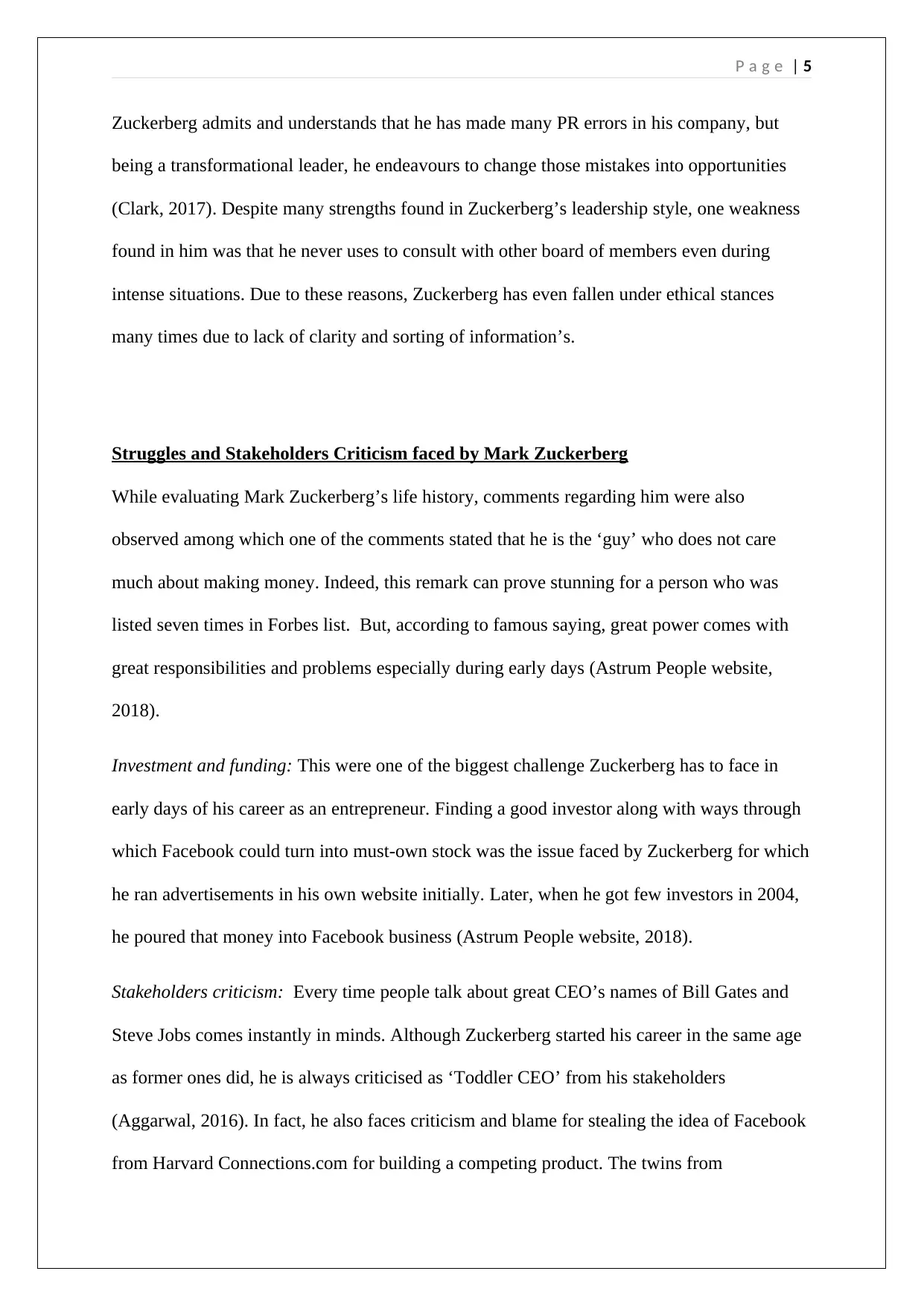
P a g e | 5
Zuckerberg admits and understands that he has made many PR errors in his company, but
being a transformational leader, he endeavours to change those mistakes into opportunities
(Clark, 2017). Despite many strengths found in Zuckerberg’s leadership style, one weakness
found in him was that he never uses to consult with other board of members even during
intense situations. Due to these reasons, Zuckerberg has even fallen under ethical stances
many times due to lack of clarity and sorting of information’s.
Struggles and Stakeholders Criticism faced by Mark Zuckerberg
While evaluating Mark Zuckerberg’s life history, comments regarding him were also
observed among which one of the comments stated that he is the ‘guy’ who does not care
much about making money. Indeed, this remark can prove stunning for a person who was
listed seven times in Forbes list. But, according to famous saying, great power comes with
great responsibilities and problems especially during early days (Astrum People website,
2018).
Investment and funding: This were one of the biggest challenge Zuckerberg has to face in
early days of his career as an entrepreneur. Finding a good investor along with ways through
which Facebook could turn into must-own stock was the issue faced by Zuckerberg for which
he ran advertisements in his own website initially. Later, when he got few investors in 2004,
he poured that money into Facebook business (Astrum People website, 2018).
Stakeholders criticism: Every time people talk about great CEO’s names of Bill Gates and
Steve Jobs comes instantly in minds. Although Zuckerberg started his career in the same age
as former ones did, he is always criticised as ‘Toddler CEO’ from his stakeholders
(Aggarwal, 2016). In fact, he also faces criticism and blame for stealing the idea of Facebook
from Harvard Connections.com for building a competing product. The twins from
Zuckerberg admits and understands that he has made many PR errors in his company, but
being a transformational leader, he endeavours to change those mistakes into opportunities
(Clark, 2017). Despite many strengths found in Zuckerberg’s leadership style, one weakness
found in him was that he never uses to consult with other board of members even during
intense situations. Due to these reasons, Zuckerberg has even fallen under ethical stances
many times due to lack of clarity and sorting of information’s.
Struggles and Stakeholders Criticism faced by Mark Zuckerberg
While evaluating Mark Zuckerberg’s life history, comments regarding him were also
observed among which one of the comments stated that he is the ‘guy’ who does not care
much about making money. Indeed, this remark can prove stunning for a person who was
listed seven times in Forbes list. But, according to famous saying, great power comes with
great responsibilities and problems especially during early days (Astrum People website,
2018).
Investment and funding: This were one of the biggest challenge Zuckerberg has to face in
early days of his career as an entrepreneur. Finding a good investor along with ways through
which Facebook could turn into must-own stock was the issue faced by Zuckerberg for which
he ran advertisements in his own website initially. Later, when he got few investors in 2004,
he poured that money into Facebook business (Astrum People website, 2018).
Stakeholders criticism: Every time people talk about great CEO’s names of Bill Gates and
Steve Jobs comes instantly in minds. Although Zuckerberg started his career in the same age
as former ones did, he is always criticised as ‘Toddler CEO’ from his stakeholders
(Aggarwal, 2016). In fact, he also faces criticism and blame for stealing the idea of Facebook
from Harvard Connections.com for building a competing product. The twins from
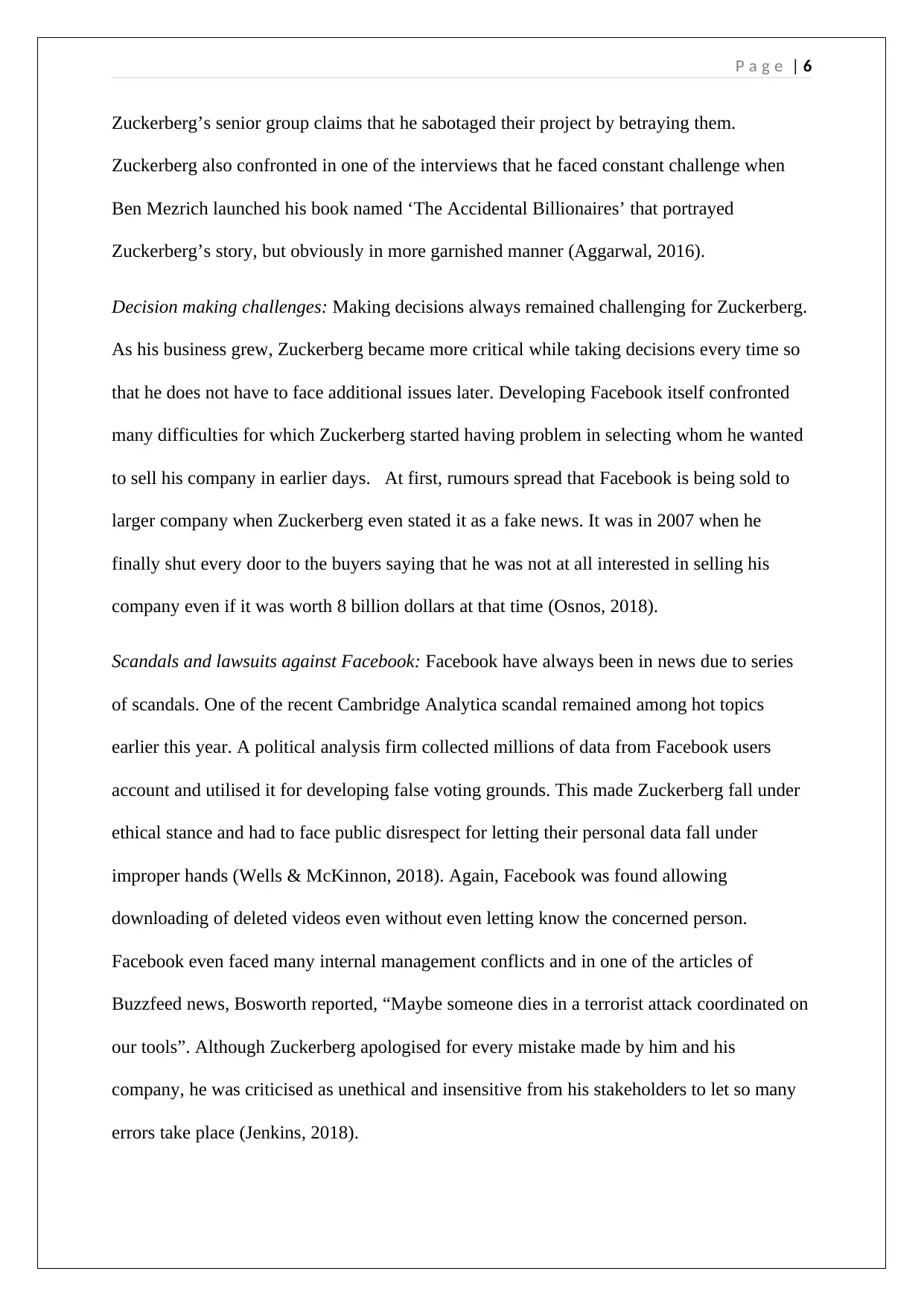
P a g e | 6
Zuckerberg’s senior group claims that he sabotaged their project by betraying them.
Zuckerberg also confronted in one of the interviews that he faced constant challenge when
Ben Mezrich launched his book named ‘The Accidental Billionaires’ that portrayed
Zuckerberg’s story, but obviously in more garnished manner (Aggarwal, 2016).
Decision making challenges: Making decisions always remained challenging for Zuckerberg.
As his business grew, Zuckerberg became more critical while taking decisions every time so
that he does not have to face additional issues later. Developing Facebook itself confronted
many difficulties for which Zuckerberg started having problem in selecting whom he wanted
to sell his company in earlier days. At first, rumours spread that Facebook is being sold to
larger company when Zuckerberg even stated it as a fake news. It was in 2007 when he
finally shut every door to the buyers saying that he was not at all interested in selling his
company even if it was worth 8 billion dollars at that time (Osnos, 2018).
Scandals and lawsuits against Facebook: Facebook have always been in news due to series
of scandals. One of the recent Cambridge Analytica scandal remained among hot topics
earlier this year. A political analysis firm collected millions of data from Facebook users
account and utilised it for developing false voting grounds. This made Zuckerberg fall under
ethical stance and had to face public disrespect for letting their personal data fall under
improper hands (Wells & McKinnon, 2018). Again, Facebook was found allowing
downloading of deleted videos even without even letting know the concerned person.
Facebook even faced many internal management conflicts and in one of the articles of
Buzzfeed news, Bosworth reported, “Maybe someone dies in a terrorist attack coordinated on
our tools”. Although Zuckerberg apologised for every mistake made by him and his
company, he was criticised as unethical and insensitive from his stakeholders to let so many
errors take place (Jenkins, 2018).
Zuckerberg’s senior group claims that he sabotaged their project by betraying them.
Zuckerberg also confronted in one of the interviews that he faced constant challenge when
Ben Mezrich launched his book named ‘The Accidental Billionaires’ that portrayed
Zuckerberg’s story, but obviously in more garnished manner (Aggarwal, 2016).
Decision making challenges: Making decisions always remained challenging for Zuckerberg.
As his business grew, Zuckerberg became more critical while taking decisions every time so
that he does not have to face additional issues later. Developing Facebook itself confronted
many difficulties for which Zuckerberg started having problem in selecting whom he wanted
to sell his company in earlier days. At first, rumours spread that Facebook is being sold to
larger company when Zuckerberg even stated it as a fake news. It was in 2007 when he
finally shut every door to the buyers saying that he was not at all interested in selling his
company even if it was worth 8 billion dollars at that time (Osnos, 2018).
Scandals and lawsuits against Facebook: Facebook have always been in news due to series
of scandals. One of the recent Cambridge Analytica scandal remained among hot topics
earlier this year. A political analysis firm collected millions of data from Facebook users
account and utilised it for developing false voting grounds. This made Zuckerberg fall under
ethical stance and had to face public disrespect for letting their personal data fall under
improper hands (Wells & McKinnon, 2018). Again, Facebook was found allowing
downloading of deleted videos even without even letting know the concerned person.
Facebook even faced many internal management conflicts and in one of the articles of
Buzzfeed news, Bosworth reported, “Maybe someone dies in a terrorist attack coordinated on
our tools”. Although Zuckerberg apologised for every mistake made by him and his
company, he was criticised as unethical and insensitive from his stakeholders to let so many
errors take place (Jenkins, 2018).
Paraphrase This Document
Need a fresh take? Get an instant paraphrase of this document with our AI Paraphraser
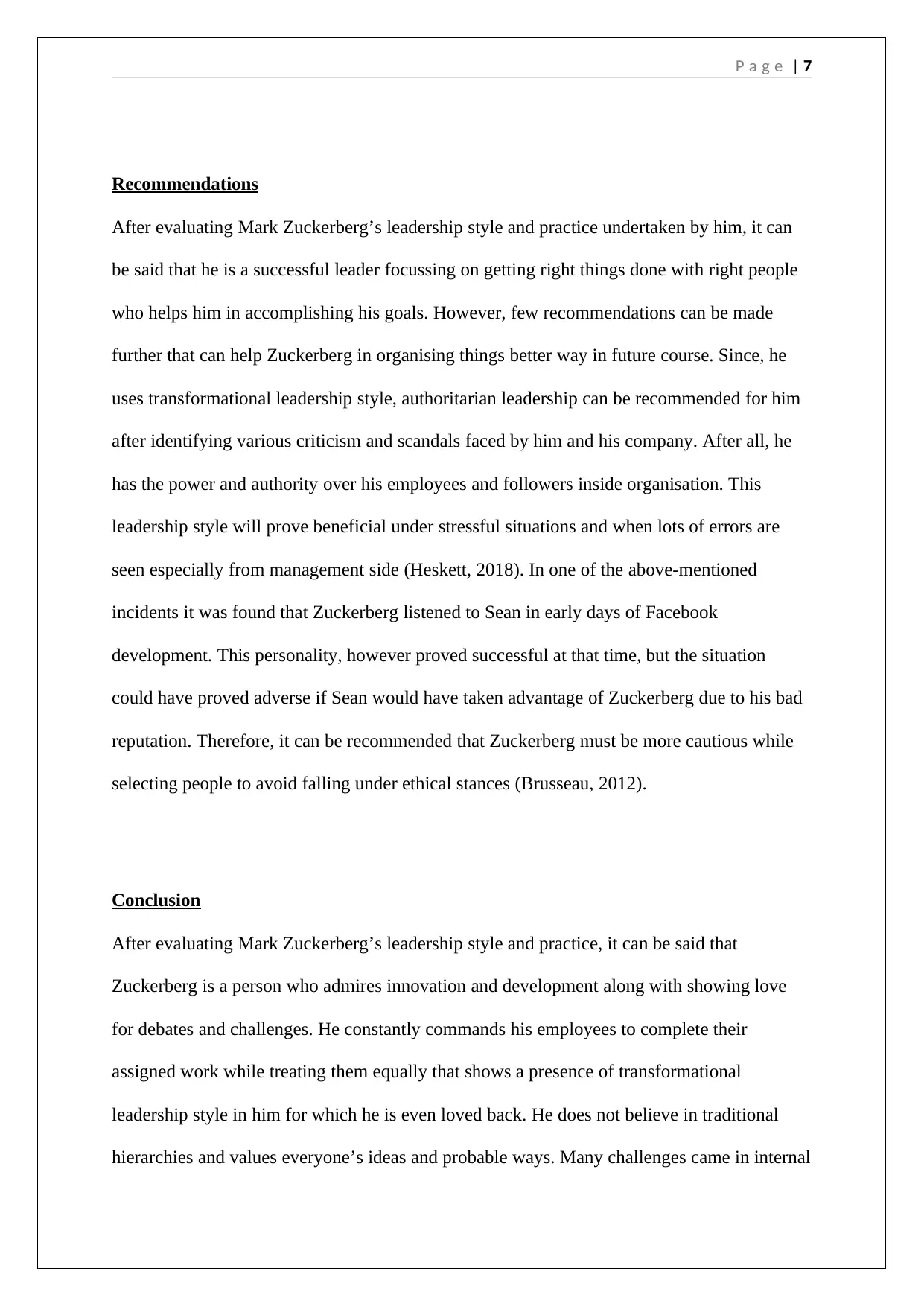
P a g e | 7
Recommendations
After evaluating Mark Zuckerberg’s leadership style and practice undertaken by him, it can
be said that he is a successful leader focussing on getting right things done with right people
who helps him in accomplishing his goals. However, few recommendations can be made
further that can help Zuckerberg in organising things better way in future course. Since, he
uses transformational leadership style, authoritarian leadership can be recommended for him
after identifying various criticism and scandals faced by him and his company. After all, he
has the power and authority over his employees and followers inside organisation. This
leadership style will prove beneficial under stressful situations and when lots of errors are
seen especially from management side (Heskett, 2018). In one of the above-mentioned
incidents it was found that Zuckerberg listened to Sean in early days of Facebook
development. This personality, however proved successful at that time, but the situation
could have proved adverse if Sean would have taken advantage of Zuckerberg due to his bad
reputation. Therefore, it can be recommended that Zuckerberg must be more cautious while
selecting people to avoid falling under ethical stances (Brusseau, 2012).
Conclusion
After evaluating Mark Zuckerberg’s leadership style and practice, it can be said that
Zuckerberg is a person who admires innovation and development along with showing love
for debates and challenges. He constantly commands his employees to complete their
assigned work while treating them equally that shows a presence of transformational
leadership style in him for which he is even loved back. He does not believe in traditional
hierarchies and values everyone’s ideas and probable ways. Many challenges came in internal
Recommendations
After evaluating Mark Zuckerberg’s leadership style and practice undertaken by him, it can
be said that he is a successful leader focussing on getting right things done with right people
who helps him in accomplishing his goals. However, few recommendations can be made
further that can help Zuckerberg in organising things better way in future course. Since, he
uses transformational leadership style, authoritarian leadership can be recommended for him
after identifying various criticism and scandals faced by him and his company. After all, he
has the power and authority over his employees and followers inside organisation. This
leadership style will prove beneficial under stressful situations and when lots of errors are
seen especially from management side (Heskett, 2018). In one of the above-mentioned
incidents it was found that Zuckerberg listened to Sean in early days of Facebook
development. This personality, however proved successful at that time, but the situation
could have proved adverse if Sean would have taken advantage of Zuckerberg due to his bad
reputation. Therefore, it can be recommended that Zuckerberg must be more cautious while
selecting people to avoid falling under ethical stances (Brusseau, 2012).
Conclusion
After evaluating Mark Zuckerberg’s leadership style and practice, it can be said that
Zuckerberg is a person who admires innovation and development along with showing love
for debates and challenges. He constantly commands his employees to complete their
assigned work while treating them equally that shows a presence of transformational
leadership style in him for which he is even loved back. He does not believe in traditional
hierarchies and values everyone’s ideas and probable ways. Many challenges came in internal
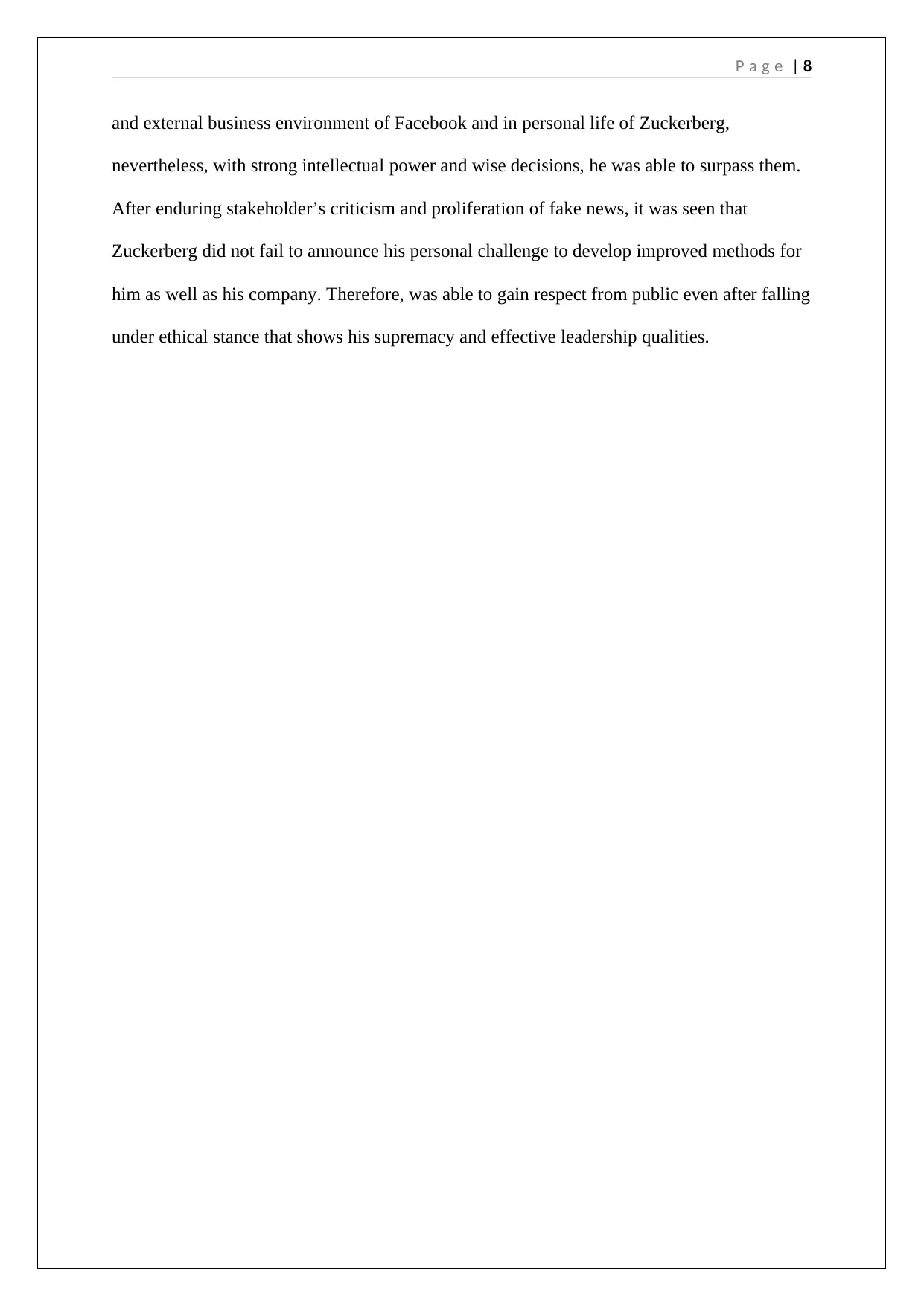
P a g e | 8
and external business environment of Facebook and in personal life of Zuckerberg,
nevertheless, with strong intellectual power and wise decisions, he was able to surpass them.
After enduring stakeholder’s criticism and proliferation of fake news, it was seen that
Zuckerberg did not fail to announce his personal challenge to develop improved methods for
him as well as his company. Therefore, was able to gain respect from public even after falling
under ethical stance that shows his supremacy and effective leadership qualities.
and external business environment of Facebook and in personal life of Zuckerberg,
nevertheless, with strong intellectual power and wise decisions, he was able to surpass them.
After enduring stakeholder’s criticism and proliferation of fake news, it was seen that
Zuckerberg did not fail to announce his personal challenge to develop improved methods for
him as well as his company. Therefore, was able to gain respect from public even after falling
under ethical stance that shows his supremacy and effective leadership qualities.
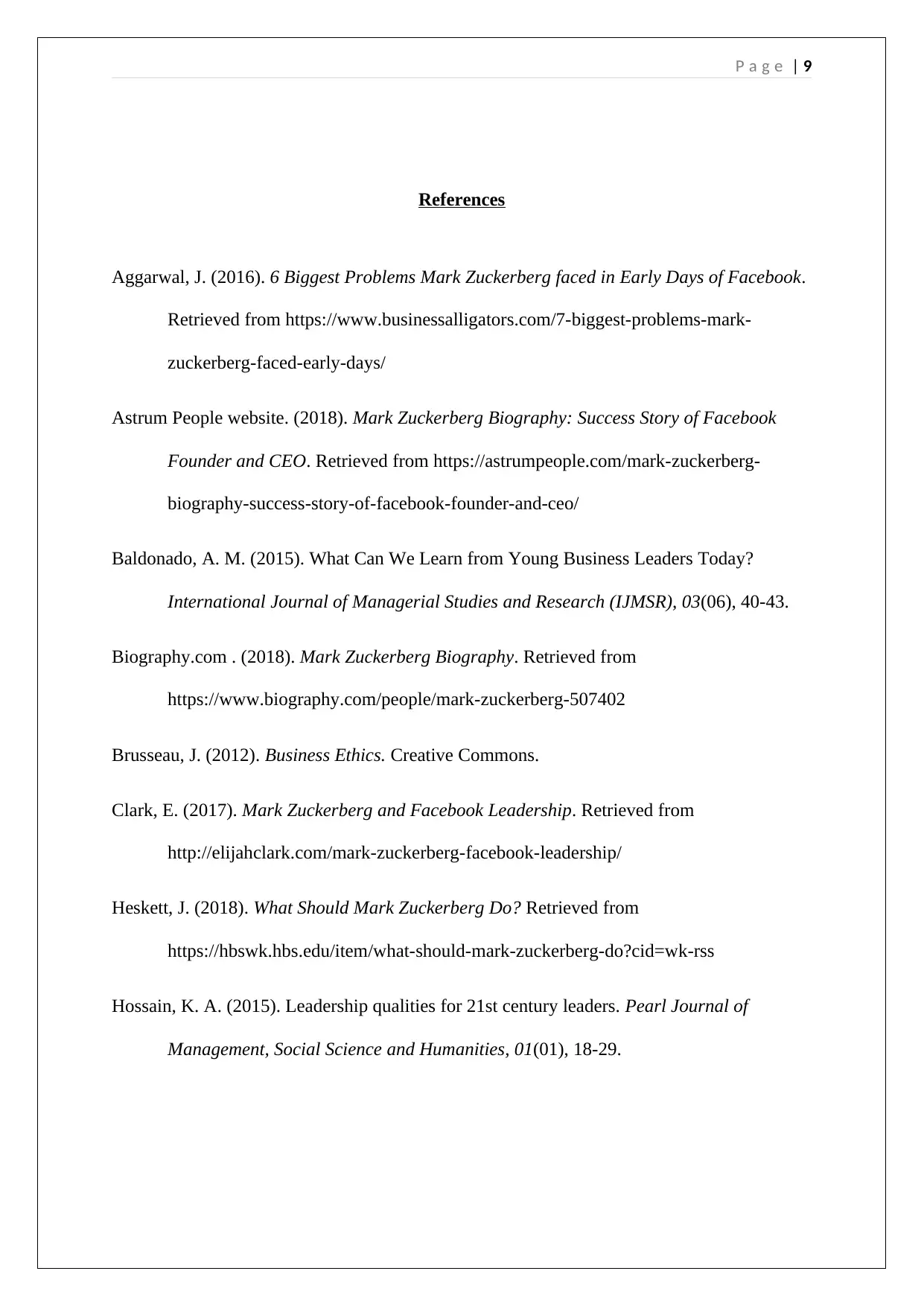
P a g e | 9
References
Aggarwal, J. (2016). 6 Biggest Problems Mark Zuckerberg faced in Early Days of Facebook.
Retrieved from https://www.businessalligators.com/7-biggest-problems-mark-
zuckerberg-faced-early-days/
Astrum People website. (2018). Mark Zuckerberg Biography: Success Story of Facebook
Founder and CEO. Retrieved from https://astrumpeople.com/mark-zuckerberg-
biography-success-story-of-facebook-founder-and-ceo/
Baldonado, A. M. (2015). What Can We Learn from Young Business Leaders Today?
International Journal of Managerial Studies and Research (IJMSR), 03(06), 40-43.
Biography.com . (2018). Mark Zuckerberg Biography. Retrieved from
https://www.biography.com/people/mark-zuckerberg-507402
Brusseau, J. (2012). Business Ethics. Creative Commons.
Clark, E. (2017). Mark Zuckerberg and Facebook Leadership. Retrieved from
http://elijahclark.com/mark-zuckerberg-facebook-leadership/
Heskett, J. (2018). What Should Mark Zuckerberg Do? Retrieved from
https://hbswk.hbs.edu/item/what-should-mark-zuckerberg-do?cid=wk-rss
Hossain, K. A. (2015). Leadership qualities for 21st century leaders. Pearl Journal of
Management, Social Science and Humanities, 01(01), 18-29.
References
Aggarwal, J. (2016). 6 Biggest Problems Mark Zuckerberg faced in Early Days of Facebook.
Retrieved from https://www.businessalligators.com/7-biggest-problems-mark-
zuckerberg-faced-early-days/
Astrum People website. (2018). Mark Zuckerberg Biography: Success Story of Facebook
Founder and CEO. Retrieved from https://astrumpeople.com/mark-zuckerberg-
biography-success-story-of-facebook-founder-and-ceo/
Baldonado, A. M. (2015). What Can We Learn from Young Business Leaders Today?
International Journal of Managerial Studies and Research (IJMSR), 03(06), 40-43.
Biography.com . (2018). Mark Zuckerberg Biography. Retrieved from
https://www.biography.com/people/mark-zuckerberg-507402
Brusseau, J. (2012). Business Ethics. Creative Commons.
Clark, E. (2017). Mark Zuckerberg and Facebook Leadership. Retrieved from
http://elijahclark.com/mark-zuckerberg-facebook-leadership/
Heskett, J. (2018). What Should Mark Zuckerberg Do? Retrieved from
https://hbswk.hbs.edu/item/what-should-mark-zuckerberg-do?cid=wk-rss
Hossain, K. A. (2015). Leadership qualities for 21st century leaders. Pearl Journal of
Management, Social Science and Humanities, 01(01), 18-29.
Secure Best Marks with AI Grader
Need help grading? Try our AI Grader for instant feedback on your assignments.
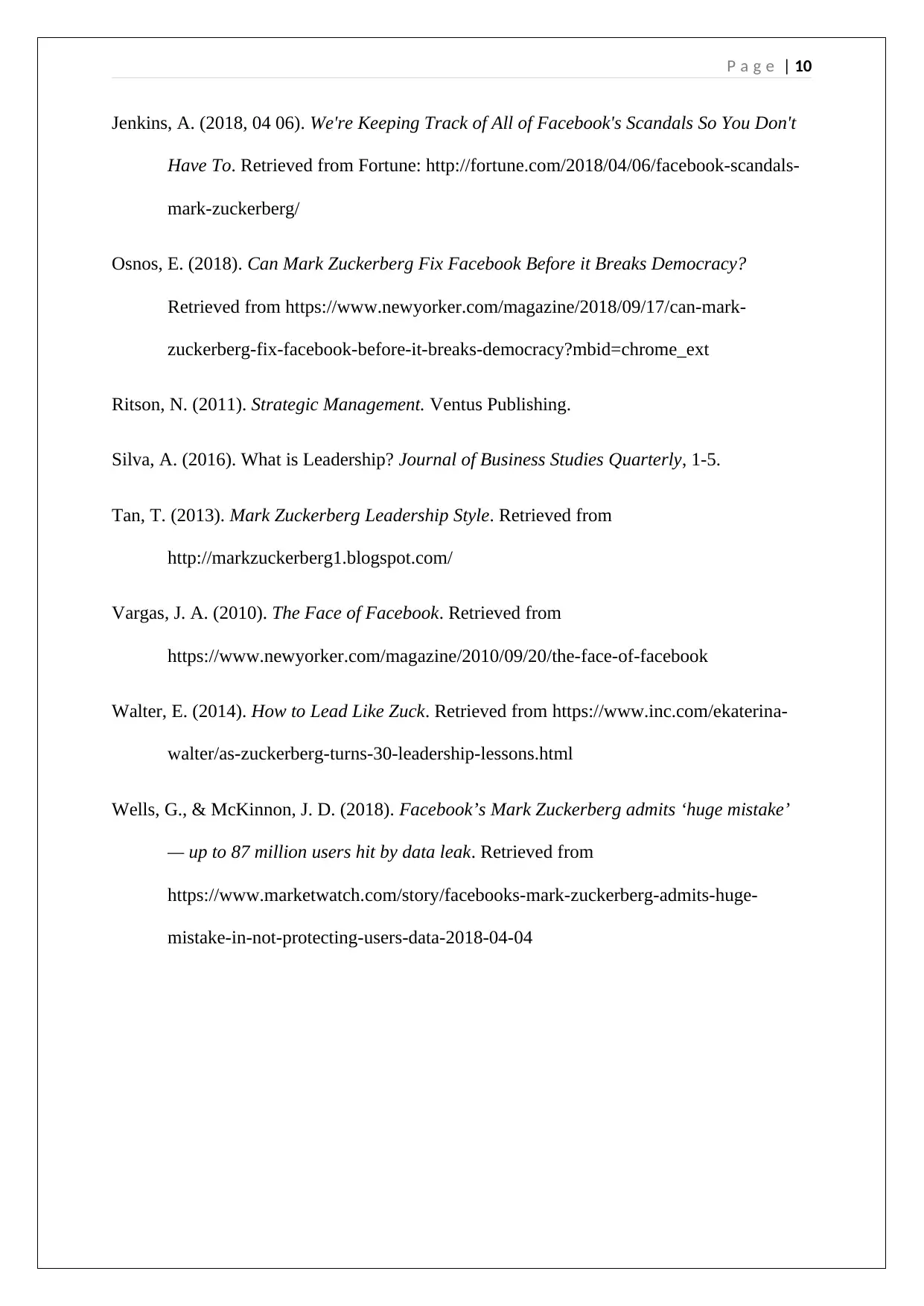
P a g e | 10
Jenkins, A. (2018, 04 06). We're Keeping Track of All of Facebook's Scandals So You Don't
Have To. Retrieved from Fortune: http://fortune.com/2018/04/06/facebook-scandals-
mark-zuckerberg/
Osnos, E. (2018). Can Mark Zuckerberg Fix Facebook Before it Breaks Democracy?
Retrieved from https://www.newyorker.com/magazine/2018/09/17/can-mark-
zuckerberg-fix-facebook-before-it-breaks-democracy?mbid=chrome_ext
Ritson, N. (2011). Strategic Management. Ventus Publishing.
Silva, A. (2016). What is Leadership? Journal of Business Studies Quarterly, 1-5.
Tan, T. (2013). Mark Zuckerberg Leadership Style. Retrieved from
http://markzuckerberg1.blogspot.com/
Vargas, J. A. (2010). The Face of Facebook. Retrieved from
https://www.newyorker.com/magazine/2010/09/20/the-face-of-facebook
Walter, E. (2014). How to Lead Like Zuck. Retrieved from https://www.inc.com/ekaterina-
walter/as-zuckerberg-turns-30-leadership-lessons.html
Wells, G., & McKinnon, J. D. (2018). Facebook’s Mark Zuckerberg admits ‘huge mistake’
— up to 87 million users hit by data leak. Retrieved from
https://www.marketwatch.com/story/facebooks-mark-zuckerberg-admits-huge-
mistake-in-not-protecting-users-data-2018-04-04
Jenkins, A. (2018, 04 06). We're Keeping Track of All of Facebook's Scandals So You Don't
Have To. Retrieved from Fortune: http://fortune.com/2018/04/06/facebook-scandals-
mark-zuckerberg/
Osnos, E. (2018). Can Mark Zuckerberg Fix Facebook Before it Breaks Democracy?
Retrieved from https://www.newyorker.com/magazine/2018/09/17/can-mark-
zuckerberg-fix-facebook-before-it-breaks-democracy?mbid=chrome_ext
Ritson, N. (2011). Strategic Management. Ventus Publishing.
Silva, A. (2016). What is Leadership? Journal of Business Studies Quarterly, 1-5.
Tan, T. (2013). Mark Zuckerberg Leadership Style. Retrieved from
http://markzuckerberg1.blogspot.com/
Vargas, J. A. (2010). The Face of Facebook. Retrieved from
https://www.newyorker.com/magazine/2010/09/20/the-face-of-facebook
Walter, E. (2014). How to Lead Like Zuck. Retrieved from https://www.inc.com/ekaterina-
walter/as-zuckerberg-turns-30-leadership-lessons.html
Wells, G., & McKinnon, J. D. (2018). Facebook’s Mark Zuckerberg admits ‘huge mistake’
— up to 87 million users hit by data leak. Retrieved from
https://www.marketwatch.com/story/facebooks-mark-zuckerberg-admits-huge-
mistake-in-not-protecting-users-data-2018-04-04
1 out of 11
Related Documents
Your All-in-One AI-Powered Toolkit for Academic Success.
+13062052269
info@desklib.com
Available 24*7 on WhatsApp / Email
![[object Object]](/_next/static/media/star-bottom.7253800d.svg)
Unlock your academic potential
© 2024 | Zucol Services PVT LTD | All rights reserved.





